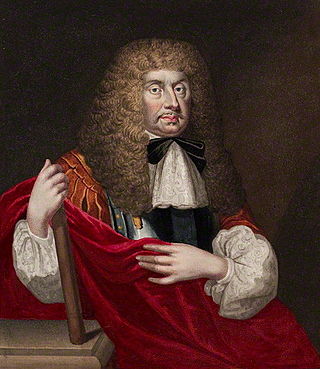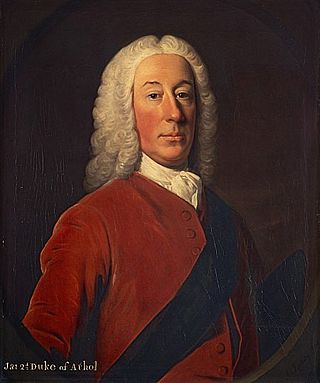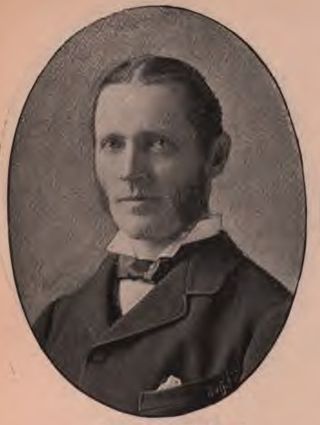
John Berkeley, 1st Baron Berkeley of Stratton of Berkeley House in Westminster and of Twickenham Park in Middlesex, was an English royalist soldier, politician and diplomat, of the Bruton branch of the Berkeley family. From 1648 he was closely associated with James, Duke of York, and rose to prominence, fortune, and fame. He and Sir George Carteret were the founders of the Province of New Jersey, a British colony in North America that would eventually become the U.S. state of New Jersey. The territorial designation of his title refers to his role at the Battle of Stratton, Cornwall, in 1643 at which the Royalists destroyed Parliament's field army in Devon and Cornwall.

James Murray, 2nd Duke of Atholl,, styled Marquess of Tullibardine between 1715 and 1746, was a Scottish peer, and Lord Privy Seal.

Ughtred James Kay-Shuttleworth, 1st Baron Shuttleworth,, known as Sir Ughtred Kay-Shuttleworth, 2nd Baronet between 1872 and 1902, was a British Liberal politician and landowner. He was Under-Secretary of State for India and Chancellor of the Duchy of Lancaster under William Ewart Gladstone in 1886 and Parliamentary and Financial Secretary to the Admiralty under Gladstone and Lord Rosebery between 1892 and 1895.

Baron Berkeley of Stratton, in the County of Cornwall, was a title in the Peerage of England. It was created in 1658 for John Berkeley, 1st Baron Berkeley of Stratton, a Royalist during the Civil War who had distinguished himself at the Battle of Stratton, fought in 1643 at Stratton in Cornwall. He was a member of the Berkeley family of Bruton in Somerset, descended from Sir Maurice de Berkeley, a younger son of Maurice de Berkeley, 2nd Baron Berkeley (1271–1326) of Berkeley Castle in Gloucestershire, the senior line of the Berkeley family. His brother was Charles Berkeley, 2nd Viscount Fitzhardinge and his nephew was Charles Berkeley, 1st Earl of Falmouth. The 1st Baron's second son, the 3rd Baron, was an Admiral in the Royal Navy who died without surviving issue and was succeeded by his younger brother, the 4th Baron, who served as First Lord of Trade between 1714 and 1715.

James Stanley, 10th Earl of Derby, styled The Honourable until 1702, was a British peer, soldier and politician. He became Captain of the Yeomen of the Guard and served in the Anglo-Dutch Brigade.
Nicholas Lechmere, 1st Baron Lechmere was an English lawyer and Whig politician who sat in the House of Commons from 1708 until 1721 when he was raised to the peerage as Baron Lechmere. He served as Attorney-General and Chancellor of the Duchy of Lancaster.

Henry Paget, 1st Earl of Uxbridge, of Beaudesert, Staffordshire, and West Drayton, Middlesex, was a British landowner and Tory politician who sat in the English and British House of Commons from 1695 until 1712 when he was raised to the peerage as Baron Burton as one of Harley's Dozen. He was a Hanoverian Tory, supportive of the Hanoverian Succession.

John Chetwynd, 2nd Viscount Chetwynd was a British diplomat and politician who sat in the House of Commons between 1715 and 1747.

Sir William Fortescue of Buckland Filleigh, Devon, was a British judge and Master of the Rolls 1741–1749.

William Byron, 4th Baron Byron was an English nobleman, politician, peer, and Gentleman of the Bedchamber to Prince George of Denmark.
Henry Petty, 1st Earl of Shelburne PC (I) was an Anglo-Irish peer and politician who sat in the House of Commons from 1715 to 1727.
The Master of the Rolls in Ireland was a senior judicial office in the Irish Chancery under English and British rule, and was equivalent to the Master of the Rolls in the English Chancery. Originally called the Keeper of the Rolls, he was responsible for the safekeeping of the Chancery records such as close rolls and patent rolls. The office was created by letters patent in 1333, the first holder of the office being Edmund de Grimsby. As the Irish bureaucracy expanded, the duties of the Master of the Rolls came to be performed by subordinates and the position became a sinecure which was awarded to political allies of the Dublin Castle administration. In the nineteenth century, it became a senior judicial appointment, ranking second within the Court of Chancery behind the Lord Chancellor of Ireland. The post was abolished by the Courts of Justice Act 1924, passed by the Irish Free State established in 1922.

St George St George, 1st Baron Saint George, was an Irish politician.
Arthur Hill-Trevor, 1st Viscount Dungannon, was an Irish politician.
David Polhill, of Chipstead, Kent, was an English landowner and Whig politician who sat in the House of Commons at various times between 1710 and 1754. He was one of the signatories of the Kentish petition in 1701.
John Berkeley, 5th Baron Berkeley of Stratton, styled The Honourable John Berkeley until 1741, was a British politician, the last of the Bruton branch of the Berkeley family.
John Moore, 1st Baron Moore PC, was an Irish politician.

Frances, Baroness Byron, was the second daughter of William Berkeley, 4th Baron Berkeley of Stratton, and his wife Frances Temple. She was the third wife of William Byron, 4th Baron Byron and a great-grandmother of the poet Lord Byron.
James Cocks, of Reigate, Surrey, was a British lawyer and Whig politician who sat in the House of Commons between 1707 and 1747.











